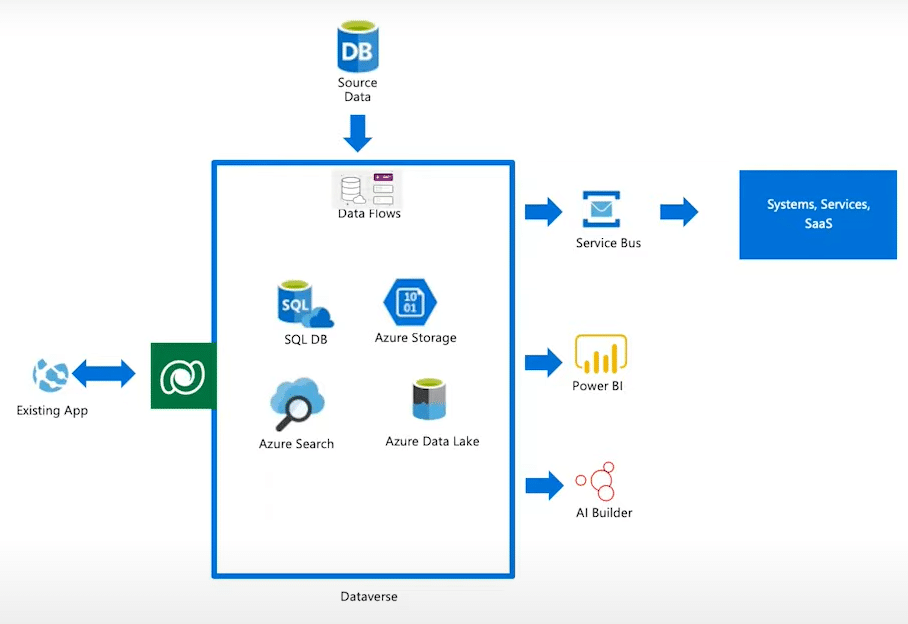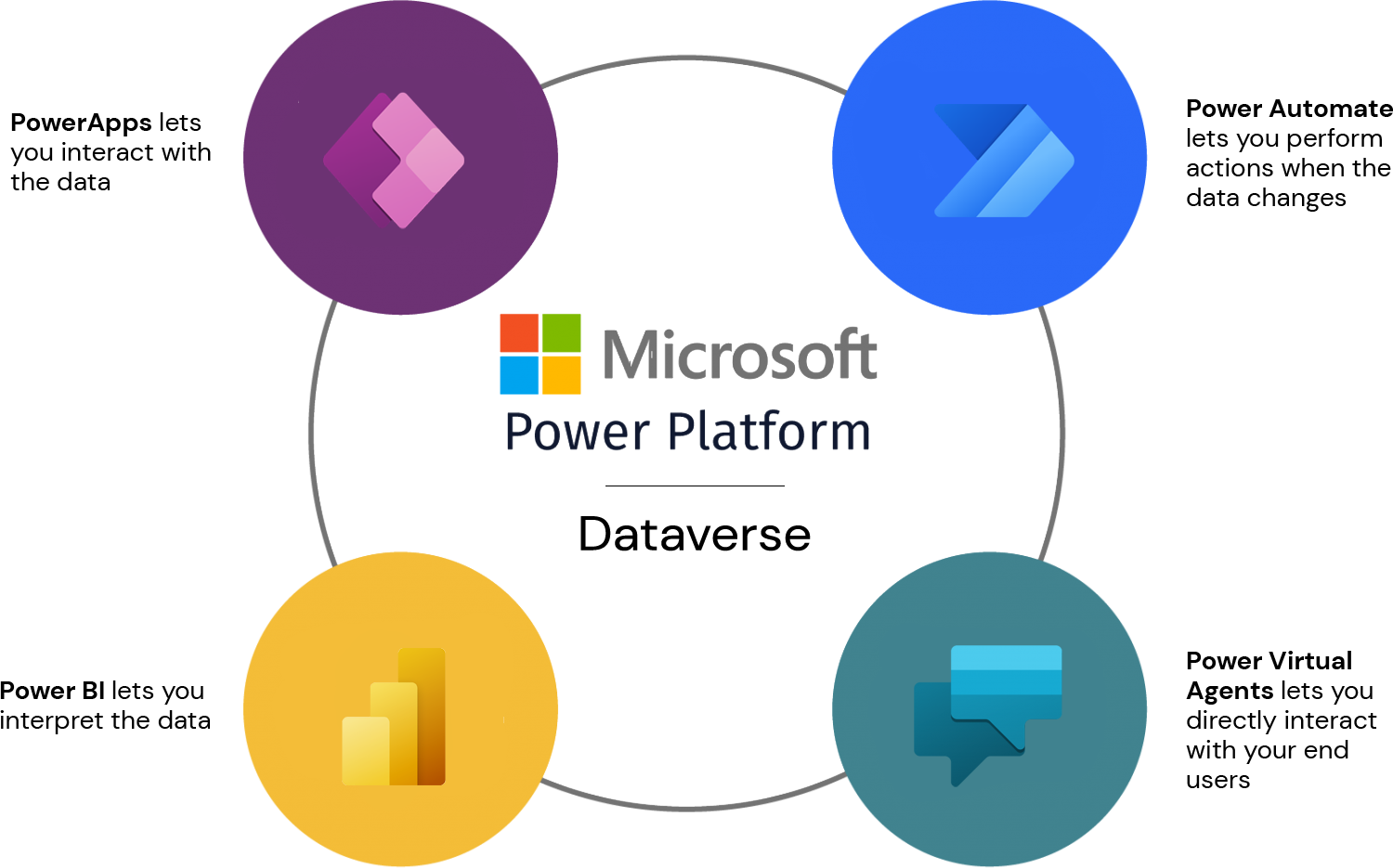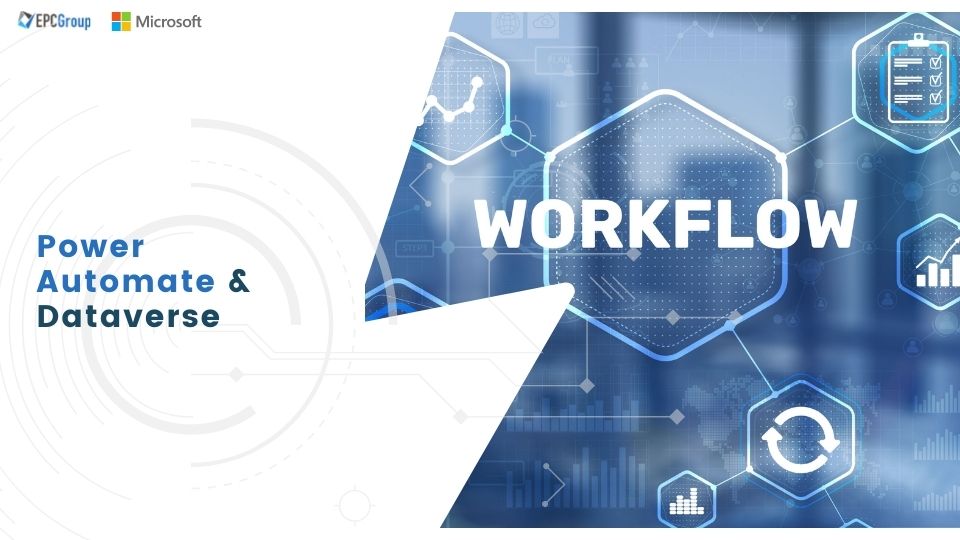Microsoft Dataverse is a tool developed by Microsoft that has the potential to boost the productivity of the user organization while limiting costs. This reduction in cost management is achieved by developing applications fast. In addition to this, the tool makes the organizational data smarter by adding low code AI tools to the business process flow automation. Furthermore, in this blog post, we will read about the benefits of Power Automate Dataverse Integration.
On the other hand, Power Automate is a service designed to aid the process of creating automated workflows between the favorite applications and services of the user company.
Microsoft Dataverse and Power Automate Integration:

The Dataverse for Teams was recently announced by Microsoft. This announcement implied that a low code data and rapid application development platform could be created for Microsoft Teams. It would empower the user organizations to build custom apps, bots, and flows in Microsoft Teams with the use of Power applications that include the Power Virtual Agent, Power Automate, and others. This integration of Dataverse within Power Automate and other Power Apps provides the user with relational data storage, enriched data types, governance of the enterprise-grade, and a one-click solution deployment directly to the Teams Apps store.
In simple words, the term Dataverse for Teams refers to the fact that certain parts of the Microsoft Power Platform have moved into the Microsoft Teams platform. Thus, the users can now create Power Apps, Power Automate Flow templates, and bots of Power Virtual Agents within the Teams using the existing licenses.
Increases in Operational Efficiency:
The Power Automate Dataverse integration can improve the operational efficiency of the user organization by providing a unified view of the business data. This unified view of the organizational data can later be used in creating flows that use the Dataverse.
The use of Dataverse within Power Automate can be used in the following set of ways:-
- Creating a cloud flow for importing or exporting and taking action in a scenario where the data changes.
- Rather than creating an approval loop through email, a cloud flow that stores the approval state in a table can be created. After this, a custom app can be built in which user companies can approve or reject the items.
Creating Power Automate Flows: Overview of the Triggers and Actions
The user organizations have three available connectors to choose from while connecting to Dataverse. These include the Microsoft Dataverse Connector, Microsoft Dataverse (Legacy) Connector, and the Dynamics 365 Connector. Microsoft Dataverse can be used in storing and managing the data for business applications and also integrate natively with different Microsoft Power Platforms like Power BI, Power Apps, Power Virtual Agent, and others from the cloud flows of the user organization.

The Microsoft Dataverse Connector provides the user company with several triggers that indicate the beginning of flows and actions that can be used in creating and updating data in the Dataverse while the flows run in the background. In addition to this, the user companies can use the Dataverse actions even if their flows do not use the Triggers from the Dataverse connectors.
Read: Power Automate Pricing overview
Apart from the triggers and actions, the Microsoft Dataverse Connector can be used to create cloud flows that begin when the data changes within the database tables and custom messages. The triggers and actions can be enumerated as follows:-
- Triggers – These define the time when the flows start running:
i) If a row is created, updated, or deleted; ii) When a row action is performed and iii) When a flow step is run from a business process flow.
- Actions – The process of managing data within the flows can be completed with the following actions:
i) creating a new row, ii) updating a row, iii) searching the rows with relevance search, iv) getting a row, v) list rows action, vi) deleting a row, vii) relating rows, viii) unrelated rows, ix) executing a charge sheet request, x) getting file or image content, and others.
Designing built-in activities through Power Automate Dataverse:
As per Power Automate consulting experts, it is one of the most beneficial services with features that can help users with automating their business processes. The process of designing built-in activities through the Power Automate Dataverse follows a general pattern of methods:-
- Choose a flow template that is useful for the work at hand. For instance a simple template like Notify and email when a new file is uploaded to OneDrive.
- Next, the Continue option has to be selected.
- Choose the OneDrive folder that has to be monitored.
- Click on the Save option.
Cloud flow template: Meaning
The term Cloud flow template refers to a cloud flow created from a template. These templates within Power Automate refer to a previously created flow that is designed to automate a process within minutes. Such a template can be made simply by selecting the pieces of the process that the user wants to automate.
Cloud flow templates can be created from several built-in templates which can send the user slack messages when the automation begins. In case the user company does not find any template matching the process needed, a cloud flow can be created from a scratch.
Uses of Cloud flow templates:
Templates are intended for use within the public gallery rather than private use. Cloud flow templates can be created and later submitted to the gallery of templates for Power Automate.
These templates fulfill certain uses for the user organizations. Cloud flow template helps the users to create flows and Automate processes without any hassle. In addition to this, these templates encourage the users to imagine the scenarios which would benefit from a cloud flow. This imagination results in the creation of new templates that later get added to the gallery.
Meaning of Search row action from Dataverse Connector:
The Dataverse Connector continues to be updated and altered from time to time. This makes finding the exact rows a bit difficult. To find the required row in Power Automate, the option considered as a search row action in the preview is provided to make this process simpler.
Benefits of Dataverse integration with Power Automate:
The benefits of Power Automate Dataverse integration includes the fact that basic business users to IT professionals can use this service to create automated processes through the no code or low code platform. In addition to this, the service can be utilized by a wide range of industries including Banking, Retail, Manufacturing, Insurance, Healthcare.
Microsoft Dataverse API Assignment: Power Automate Flow

The topic of which account is charged for creating the flows is very misunderstood. In this context, it is to be well understood that the credentials of the account used to invoke the action are not charged with the API phone calls activity. But the user organization can establish a granular control on which account gets charged for the flow API calls by creating a control chart.
Dataverse Environment URL: Enumerating the process of finding it
The method of finding the database environment URL include the following:-
- Select the Power apps and the environment that it has to be connected to. Click on Settings and select session details.
- Within the Power apps, session details click on copy details.
- Paste the session details somewhere so that the instance URL can be copied. This instance URL is the unique URL of the environment.
EPC Group as the Dataverse Consulting Partner
Microsoft has renamed its Common Data service as Microsoft Dataverse. The EPC Group is a highly experienced group of professional consultants that provide Microsoft Dataverse consulting to client organizations with the opportunity to use the features of Dataverse to their complete potential. The company also continues to give cost-effective consultation and round-the-clock support to optimize the Dataverse and Power Platforms.









